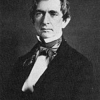William H. Seward

William H. Seward
William Henry Sewardwas United States Secretary of State from 1861 to 1869, and earlier served as Governor of New York and United States Senator. A determined opponent of the spread of slavery in the years leading up to the American Civil War, he was a dominant figure in the Republican Party in its formative years. Although regarded as the leading contender for the party's presidential nomination in 1860, he was defeated by Abraham Lincoln...
NationalityAmerican
ProfessionStatesman
Date of Birth16 May 1801
CountryUnited States of America
The proposition of an established classification of states as slave states and free states, as insisted on by some, and into northern and southern, as maintained by others, seems to me purely imaginary, and of course the supposed equilibrium of those classes a mere conceit.
The territory is a part, no inconsiderable part, of the common heritage of mankind, bestowed upon them by the Creator if the universe.
To reduce this claim of slavery to an absurdity, it is only necessary to add that there are only two states in which slaves are a majority, and not one in which the slaveholders are not a very disproportionate minority.
I submit, on the other hand, most respectfully, that the Constitution not merely does not affirm that principle, but, on the contrary, altogether excludes it.
It is true, indeed, that the national domain is ours. It is true it was acquired by the valor and with the wealth of the whole nation. But we hold, nevertheless, no arbitrary power over it.
If slavery, limited as it yet is, now threatens to subvert the Constitution, how can we as wise and prudent statesmen, enlarge its boundaries and increase its influence, and thus increase already impending dangers?
Sir, there is no Christian nation, thus free to choose as we are, which would establish slavery.
I know and all the world knows, that revolutions never go backwards.
The color of the prisoner's skin, and the form of his features, are not impressed upon the spiritual immortal mind which works beneath. In spite of human pride, he is still your brother, and mine, in form and color accepted and approved by his Father, and yours, and mine, and bears equally with us the proudest inheritance of our race - the image of our Maker. Hold him then to be a Man.
There is no social life outside of Christendom.
Whatever policy we adopt, there must be an energetic prosecution of it. For this purpose it must be somebody's business to pursue and direct it incessantly.
No man will ever be president of the United States who spells Negro with two g's.
But there is a higher law than the Constitution, which regulates our authority over the domain, and devotes it to the same noble purposes.
It would be contrary to the spirit of the American Government to use force to subjugate the South.